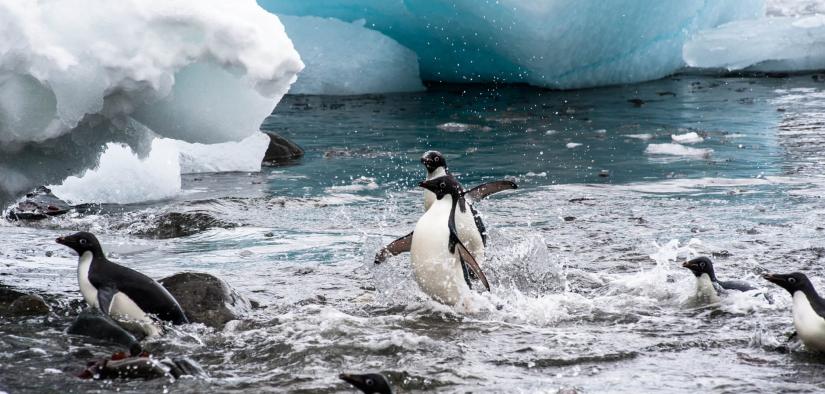 US scientists have peered ahead in more than five million ways, and they do not like the uncertain futures they see there. Unless the world collectively and in concert takes drastic steps to slow or halt global warming, generations to come face an intolerable prospect.
US scientists have peered ahead in more than five million ways, and they do not like the uncertain futures they see there. Unless the world collectively and in concert takes drastic steps to slow or halt global warming, generations to come face an intolerable prospect.
And even if humans do switch from fossil fuels to renewable energy, economise on resources and restore the world’s forests and grasslands, there is still no guarantee that disaster will not happen.
That is because the outcome depends not just on the steps humans take now, but on one of the great, unresolved scientific questions: just how sensitive is climate to shifts in the levels of carbon dioxide in the atmosphere?
If sensitivity is low, and humankind acts effectively and immediately, the future could be tolerable. But in a total of 5,200,000 computer-generated scenarios involving population growth, economic development, the role of carbon in the economy and the levels of climate sensitivity, this happens only relatively infrequently.
“If large abatement efforts are undertaken, warming is generally limited and damages are low. However, aggressive abatement action does not guarantee a ‘tolerable’ future,” the scientists write, in the journal Nature Climate Change.
Good luck needed
“Our simple analysis shows that, to achieve a tolerable future, we must also have the good fortune of living in a world with low climate sensitivity. Failure to rapidly increase abatement all but guarantees failure over a very wide range of climate sensitivities.
“We show that our generation has an important responsibility to ensure that coming generations have a tolerable future.”
And they conclude: “It is still, however, a gamble that depends on how sensitive the climate turns out to be and how soon the promises of negative emissions materialise, but we show immediate rapid growth in abatement remains our safest course of action.”
At the heart of all such studies is the question: how much time does human society have before climate change becomes dangerous and inevitable?
The scientists defined “tolerable” as a future in which global warming stopped, by 2100, at 2°C or less above historic levels, a future 195 nations have already agreed to work for in Paris in 2015.
To achieve this tolerable future, the scientists reasoned that the cost of abatement should be no more than 3% of the gross world product, and the damage wrought by climate change no more than 2%. Then they considered 24 levels of uncertainty in what they call the “human-Earth system” and generated their vast number of possible outcomes.
Since the beginning of the Industrial Revolution, carbon dioxide levels in the atmosphere have already soared from around 280 parts per million to more than 400 ppm, and global average temperatures have soared with them, to around 1°C above the average for most of human history.
Climate scientists have already identified the costs of “intolerable” climate change. They warn that as the thermometer rises, so does the threat of devastating famine. Extremes of heat become increasingly lethal. Floods could become more devastating and sea levels rise dangerously. Drought, rising temperatures and food shortages are likely to create the conditions for dangerous conflict.
But in 2019 greenhouse gas emissions from fossil fuels are likely to be higher than ever. The world is already midway through the hottest decade since records began. And the planet could tip the 1.5°C global average temperature rise – the target proposed in Paris – in the next decade.
No reassurance
The consequences of accelerated global warming could be calamitous, but there is still argument about the rate of change, the role of the natural cycles in atmosphere and ocean that influence climate, the scale of hazard to human civilisation and the nature of the steps vital to contain warming.
So the US researchers decided to look at the whole range of possible future outcomes. Their answers are not reassuring.
The message is that either global economies react now – at considerable cost and for no immediate reward – or that future generations must pay what could be a wretched price for present inaction.
“Despite massive uncertainties in a multitude of sectors, human actions are still the driving factor in determining the long-term climate,” said Jonathan Lamontagne, a civil engineer at Tufts University in Massachusetts, who led the study.
“Uncertainty is sometimes interpreted as an excuse for delaying action. Our research shows that uncertainty can be a solid reason to take immediate action.”
 Others
Others
41239 hour(s) 29 minute(s) ago ;
Morning 02:23 ; Tuesday ; Jul 01, 2025
Uncertain futures warn world to act as one
Send
Climate News Network
Published : 06:00, Mar 17, 2019 | Updated : 06:00, Mar 17, 2019
Published : 06:00, Mar 17, 2019 | Updated : 06:00, Mar 17, 2019
0 ...0 ...
/hm/
Topics: Top Stories
- KOICA donates medical supplies to BSMMU
- 5 more flights to take back British nationals to London
- Covid19: Rajarbagh, Mohammadpur worst affected
- Momen joins UN solidarity song over COVID-19 combat
- Covid-19: OIC to hold special meeting
- WFP begins food distribution in Cox’s Bazar
- WFP begins food distribution in Cox’s Bazar
- 290 return home to Australia
- Third charter flight for US citizens to return home
- Dhaka proposes to postpone D8 Summit
Unauthorized use of news, image, information, etc published by Bangla Tribune is punishable by copyright law. Appropriate legal steps will be taken by the management against any person or body that infringes those laws.
Bangla Tribune is one of the most revered online newspapers in Bangladesh, due to its reputation of neutral coverage and incisive analysis.
F R Tower, 8/C Panthapath, Shukrabad, Dhaka-1207 | Phone: 58151324; 58151326, Fax: 58151329 | Mob: 01730794527, 01730794528


